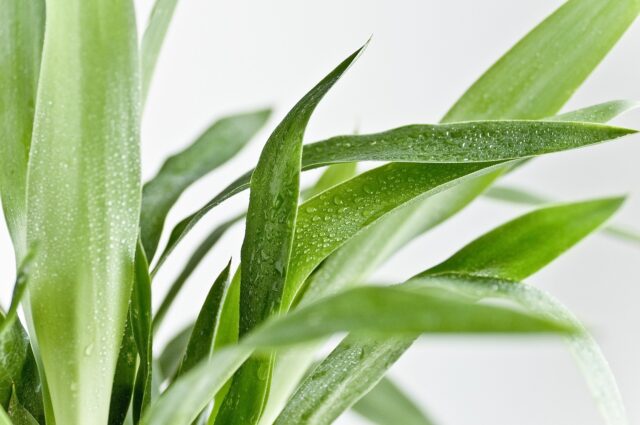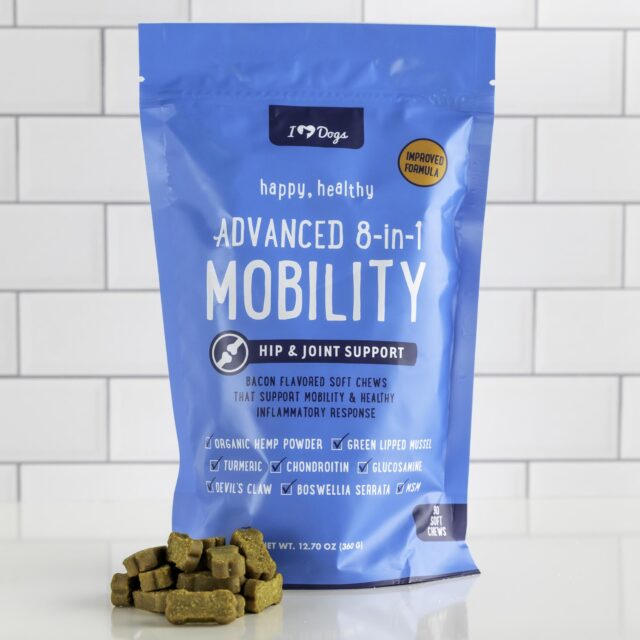When your dog’s body is inflamed or irritated, it’s not always visible to the human eye. Your dog could be suffering from joint pain or other inflammation long before you notice it. Even young dogs could develop aching joints due to wear and tear. Luckily, many ingredients in supplements and dog food can combat their aching joints. Yucca schidigera for dogs is one method of relieving all types of inflammation.
Adding yucca to your dog’s diet may help soothe their joints and other aspects of their health. So, what is yucca schidigera, and what can it do for your furry friend?

What is Yucca Schidigera for Dogs?
Yucca schidigera for dogs comes from an evergreen shrub or small tree found in the lily family. It’s sometimes referred to as the Mojave yucca or the “Spanish Dagger.” It’s native to deserts across southern North America, including the Mojave Desert and the Sonoran Desert. These plants rely on rocky environments, full sun exposure, and lots of drainage to thrive.
Native Americans used yucca as a medicine to help with dandruff, headaches, and joint pain. Humans continue to use it for similar purposes to this day, and it has since expanded to pet use too.
The trunks of these yucca trees are ground up and made into powders and extracts that are safe for humans and animals. The extract is regularly added to food for dogs, cats, rabbits, and ferrets. It’s an herbal medicine that has fewer risks than medications.

Why is Yucca Schidigera Found in Dog Food?
You might notice yucca schidigera as an ingredient in your dog’s food. It’s not essential to the canine diet, but using it in food may reduce the stench of your dog’s stools. Studies have also shown that dog food with yucca schidigera could have anti-inflammatory properties. So, it’s an all-natural ingredient in your pet’s diet that can have several benefits for them.
Not all dog food brands contain yucca. Yucca schidigera is found in about 20% of dog brands, but it’s more common in cat food. You can check the ingredient list to see if it’s in your dog’s food. It’s usually located toward the middle or bottom of the list.
Is Yucca Schidigera Extract Safe for Dogs?
Yes, yucca schidigera extract is safe for dogs. Yucca has plenty of vitamins and minerals for your furry friend, including vitamins A, B, and C. However, the whole plant is not safe because it could cause intestinal problems. Luckily, if you stick to the extract or other dog-specific supplements, you won’t have to worry about that concern. It’s rare that your dog would ever get a hold of the entire plant.
Related: The 10 Best Calming Supplements for Dogs
What Are The Benefits Of Yucca Schidigera For Dogs?
Yucca schidigera is best known for its inflammation relief, but it can have several other benefits as well. Here are a few ways that this ingredient can improve your dog’s health.

Reduces Joint Inflammation
This plant has properties that can soothe arthritis and other joint pain. It contains saponins and polyphenolics, which are suspected of lowering joint inflammation. While it has anti-inflammatory properties on its own, it works best when paired with other ingredients that benefit joints.
In addition to relieving joint pain, yucca schidigera may be able to help with other types of inflammation, too, such as skin irritation and minor injuries. While studies have shown its effects on canine inflammation, scientists believe more research would be beneficial to discover why yucca has these positive effects.
Regulates Diabetes
Yucca schidigera is rich in carbohydrate makeup and dietary fiber. So, the extract can be a beneficial snack for dogs with diabetes. It has about four grams of fiber per cup, making it excellent at controlling weight, digestion, cholesterol, and blood sugar. However, if you want to use it for this purpose, you should discuss your dog’s diabetes with a vet first.
Lessens Fecal Odors
One of the main reasons yucca is used in dog food is because it can cause dog urine and feces to stink less. Scientists had to look at the chemical breakdown of a dog’s waste before it left the body to discover this effect.
Researchers saw that anhydrous ammonia, which worsens feces odor, was inhibited by yucca schidigera. The ingredient also reduces the amount of hydrogen sulfide in the gut, which may contribute to smelly poop. The stench of urine and feces could be reduced up to 56% if your dog has this ingredient in its diet.
Related: 12 Best Dog Breath Fresheners

Lowers Disease Symptoms
Yucca contains saponins, which foam up when they come into contact with water. When dogs consume small amounts, they can experience healthier mucous membranes and gastrointestinal tracts. Thus, yucca schidigera can help your dog’s body absorb nutrients better. However, be cautious of the dosage since too many saponins could cause intestinal problems.
The polyphenols in yucca may also give your dog a general health boost. They can reduce the number of free radicals in the body, which can damage cells. So, removing free radicals will help your dog stay healthy overall.
This ingredient may also reduce symptoms for other health problems, such as headaches and cancer, but more research needs to be done. As long as your dog is getting a proper dose, yucca can give them a slight health boost in so many ways.
Related: The 13 Best Heart Supplements for Dogs
How To Calculate Yucca Schidigera Dosage for Dogs?
The yucca schidigera dosage for dogs varies considerably based on the product you use. If you purchase a supplement that contains yucca schidigera extract, you should follow the recommended dosage on the container. Products that have more than 2% yucca should be evaluated by a vet before giving them to your dog.
A general dosage for plain yucca schidigera extract is 1/4 to 1/2 teaspoons daily. You can mix it with your dog’s food, giving it to them about every other day. That should be enough to lower inflammation and reduce stool stench. If your dog already has yucca schidigera in their food, adding some may not be necessary.

When in doubt, talk to your vet about proper dosage. They can help you decide on the best product and ideal amount based on your dog’s age, weight, and medical history.
Are There Side Effects With Yucca Schidigera for Dogs?
For the most part, yucca schidigera is a healthy and natural ingredient. However, it’s high in saponins, and too many saponins could be toxic for canines. An excess of saponins can irritate your dog’s intestines and nervous system, which is why following the proper dosage is crucial.
To keep your dog as safe as possible, give them the extract rather than the whole plant. The plant itself will taste bitter and cause digestive problems. The extract has a much lower risk, which is why it’s the part of the plant used in dog food and supplements. It’s rare for dogs to have side effects if fed the correct dosage.
Some side effects of an overdose include vomiting, diarrhea, drooling, lethargy, and increased heart rate. If you notice any unusual symptoms after your dog starts taking yucca, take them to the vet to be safe.
Are There Any Drug Interactions With Yucca Schidigera?
Yucca schidigera isn’t known to have any drug interactions. However, tell your vet if your dog is taking any other medications or supplements before using a supplement with this ingredient.
Related: 11 Best Dog Immunity Supplements

How to Serve Yucca Schidigera to Dogs
Most dog parents serve yucca schidigera to their dogs by purchasing a joint supplement that includes it. Most joint supplements come in the form of a chew or tablet for your dog to consume. For supplements that look like pills, you may need to hide them in pill pockets to get your dog to eat them. However, soft chews often look and smell like treats, making them great for picky pups.
Yucca schidigera extract for dogs can also come in a powder or liquid tincture. These forms may be easier to mix with your dog’s food, but be sure to check the amount of yucca in them. If a product has a high amount of yucca, it’s more likely to cause intestinal issues. When in doubt, ask your vet if a product is safe for your furry friend.
When choosing a supplement for your dog, it’s important to buy from a company you trust. Look closely at the ingredient list to ensure the product only includes things you feel safe giving your dog.
Related: 10 Best Eye Supplements for Dogs
Safe and Soothing!
If you’re looking for a safe yucca schidigera supplement, iHeartDogs Advanced 8-in-1 Hip & Joint Chews might be a good option for your dog. They’re small, chewable supplements that will seem like treats to your four-legged family member. These chews are meant to ease joint pain, prevent cartilage damage, and improve mobility.
In addition to yucca schidigera, these supplements also include glucosamine HCl, omega-rich organic hemp powder, MSM, chondroitin, green-lipped mussels, organic turmeric, and Boswellia serrata. All these ingredients have anti-inflammatory properties, along with additional health benefits. Every container donates 14 healthy meals to shelter dogs, so you can help dogs in need while also benefitting your canine’s health.
Watching your dog struggle with inflammation is difficult, especially since they can’t tell us exactly what’s wrong. Luckily, ingredients like yucca schidigera can help a dog feel healthy and young again. Even if your dog’s food has yucca in it, a joint supplement may be able to reduce their discomfort even further.
- Best Joint Supplement for Dogs
- Best CBD Gummies for Dogs
- Goat's Milk for Dogs
- Skin & Coat Supplements for Dogs
- Weight Gain Supplements for Dogs
- Muscle Building Supplements for Dogs
- Heart Supplements for Dogs
- Multivitamins for Dogs
- Pill Pockets for Dogs
- Digestive Enzymes for Dogs
- Turmeric for Dogs
- Liver Supplements for Dogs
- Tear Stain Supplement for Dogs
- Breath Fresheners for Dogs
- Kidney, Urinary, & Bladder Supplements for Dogs
- Stool Eating Deterrent for Dogs
- Eye Supplements for Dogs
- Melatonin for Dogs
- Apple Cider Vinegar for Dogs
- Green Lipped Mussels for Dogs
- L Theanine for Dogs
- Chondroitin Supplements for Dogs
- MSM for Dogs
- Valerian Root for Dogs
- Chamomile for Dogs
- Boswellia for Dogs
- L Tryptophan for Dogs
- Yucca for Dogs
- Licorice Root for Dogs
- Bromelain for Dogs
- Papain for Dogs
- Devil's Claw for Dogs
- Quercetin for Dogs
- Hemp gummy for dogs
- Best Hemp Dog Treats
- Best Hemp Oil for Dogs
- Best Calming Treats, Chews, & Supplements for Dogs
- Best Bone Broth for Dogs
- Best Fish Oil for Dogs
- Best Probiotics for Dogs
- Best Hip Dysplasia Supplements for Dogs
- Best Colostrum for Dogs
- Best Quercetin for Dogs
- Best Greens for Dogs Supplements
- Best Vitamin C Supplements for Dogs
- Best Probiotic for Dog with Allergies
- Best Taurine Supplements for Dogs
- Best Dog Food Toppers
- Best Anal Gland Supplement for Dogs
- Best Dog Probiotic Powder
- Best CoQ10 Supplement for Dogs
- Best Liquid Glucosamine for Dogs
- Best Wrinkle Creams, Balms, and Wipes for Dogs
- Best Puppy Calming Treats
- Best Colloidal Silver for Dogs
- Best Adaptogen Supplements for Dogs
- Best Cognitive Supplements for Dogs
- Best Bee Pollen for Dogs
- Best Vitamin A Supplements for Dogs
- Best Vitamin E Supplements for
- Best Liquid Glucosamine Supplements for Dogs
- Best SAM-e Supplements for Dogs
- Best Hyaluronic Acid Supplements for Dogs
- Best Apple Cider Vinegar Supplements for Dogs
- Best Diarrhea Medicine for Dogs
- Best Milk Thistle for Dogs
- Best Turkey Tail Mushroom Supplements for Dogs
- Best Astaxanthin Supplements for Dogs
- Best Lutein Supplements for Dogs
- Best Electrolyte Supplements for Dogs
- Best Coconut Oil for Dogs
- Best Prenatal Vitamins for Dogs
- Best Puppy Milk Replacements
- Best Iron Supplements for Dogs
- Best Dewormer Products for Dogs
- Best Mange Medications for Dogs
- Best Cough Relief Products for Dogs
- Best Sinus Relief Products for Dogs
- Best Collapsed Trachea Supplements for Dogs
- Best Fireworks Anxiety Relief Products for Dogs
- Best Thunderstorm Anxiety Relief Products for Dogs
- Best Travel Anxiety Relief Product for Dogs
- Best Supplements for a Dog with a Torn ACL
- Best Supplements for a Dog with Patellar Luxation
- Best Supplements for a Dog with Intervertebral Disc Disease
- Best Zinc Supplements for Dogs
- Best Biotin Supplements for Dogs
- Best Tart Cherry Supplements for Dogs
- Best Resveratrol Supplements for Dogs
- Best Ginkgo Biloba Supplements for Dogs
- Best Ashwagandha Supplements for Dogs
- Best Supplements for Dogs with Cushing's Disease
- Best Adrenal Supplements for Dogs
- Best NAD+ Supplements for Dogs
- Best NMN Supplements for Dogs
- Best Supplements for Dogs with Dementia
- Best Supplements for Dogs with CCD(Canine Cognitive Dysfunction)
- Best Fiber Supplements for Dogs
- Best Spirulina for Dogs
- Best Hairball Remedies for Dogs
- Best Eye Drops for Dogs with Allergies
- Best Magnesium Supplements for Dogs
- Best Brushes for Double-Coated Dogs
- Best Dandelion Root Supplements for Dogs
- Best Probiotic for Dogs with Yeast Infections
- Best Flaxseed Oil for Dogs
- Best Chamomile Supplements for Dogs
- Best Lavender Supplements. Treats & Sprays for Dogs
- Best Collagen Supplements for Dogs
- Best Kelp Supplements for Dogs
- Best Activated Charcoal for Dogs
- Best Slippery Elm Supplements for Dogs
- Best Supplements for Dogs with Seizures & Epilepsy
- Best Antioxidant Supplements for Dogs
- Best Ubiquinol Supplements for Dogs
- Best Hormone & Glandular Supplements for Dogs
- Best Thyroid Supplements for Dogs
- Best Iodine Supplements for Dogs
- Best Dog Shedding Supplements for Dogs
- Best Detox Supplements for Dogs
- Best Postbiotics for Dogs
- Best Aspirin Products for Dogs
- Best Dog Anti-Nausea Products
- Best Dog Mouthwashes
- Best Camelina Oils for Dogs
- Best Hemp Seed Oils for Dogs
- Best Natural Anti-Inflammatories for Dogs
- Best Cancer Supplements for Dogs
- Best Sardine & Anchovy Oils for Dogs
- Best Fatty Acid Supplements for Dogs
- Best Chia Seed Supplements & Treats for Dogs
- Best Olive Oils for Dogs
- Best Amino Acid Supplements for Dogs
- Best Moringa Supplements for Dogs
- Best Echinacea Supplements for Dogs
- Best Cranberry Supplements for Dogs
- Best D-Mannose Supplements for Dogs
- Best Nettle Leaf Supplements for Dogs
- Best Marshmallow Root Supplements for Dogs
- Best Astragalus Supplements for Dogs
- Best Pumpkin Seed Supplement for Dogs
- Best Supplements for a Dog Wetting The Bed
- Best Blueberry Supplement for Dogs
- Best Bromelain Supplements for Dogs
- Best Yucca Supplements for Dogs
- Best Ginger Supplements for Dogs
- Best Rosehip Supplements for Dogs
- Best Allergy Medicines for Dogs
- Best Reishi Mushroom Supplement for Dogs
- Best Maitake Mushroom Supplement for Dogs
- Best Chaga Mushroom Supplement for Dogs
- Best Shiitake Mushroom Supplement for Dogs
- Best Cordyceps Mushroom Supplement for Dogs
- Best Lion's Maine Supplement for Dogs
- Have question? - Ask in our Dog Health Forum

 Toledo, United States.
Toledo, United States.
